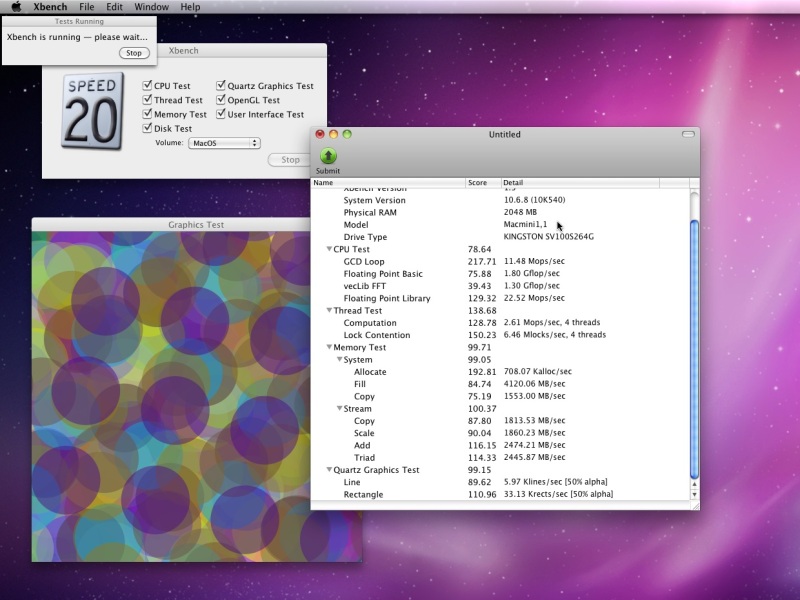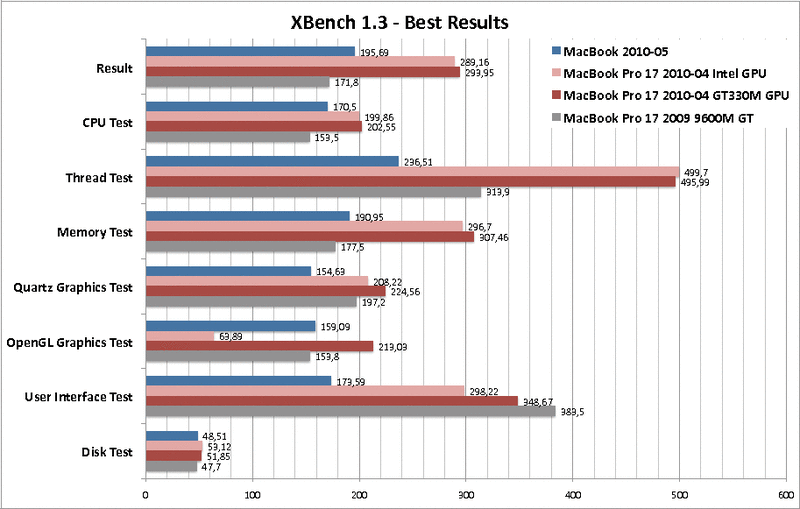

CPU type (The Core i7 has built-in technology to accelerate AES encryption).


This differs from the 2011 MacBook without Encryption test as this was done relatively shortly after first turning on the new machine. In the case of the 2010 MacBook without Encryption test, and both FileVault tests, both drives had about 100GB of data on them. In both cases, I had a pretty pristine admin account (I create an admin account at first setup, and basically never touch it again). I used XBench 1.3, only ran the disk test, ran it 3 or 4 times, and if any set of results was drastically different from the rest, I threw it away and averaged the rest. First, the machine’s raw specs:ġ28 GB SSD (identified as an APPLE SSD TS128C)Ģ56 GB SSD (identified as an APPLE SSD SM256C) Now, I am not a scientist, so please expect some human and environmental error here. So, when my new machine arrived, I decided to record and publish my own benchmarks.
#Xbench 1.3 upgrade#
This was something I was very interested in, but the results seemed inconclusive to me, and none were specific to the upgrade I was awaiting.
#Xbench 1.3 full#
While awaiting its construction and arrival, some initial benchmarks had been released on the web for Lion’s full disk encryption, aka FileVault 2. So I ordered a fully loaded 11.6" model, this time with a 1.8 GHz Core i7 with 4 GB of RAM and a 256 GB SSD. Regardless, while I was able to condense my entire life to fir on 128 GB, down from 250 GB, I had no breathing room, so when the 2011 MacBook Airs were announced, I upgraded again. Shortly after I purchased it in February, there were some reports that Apple was using different SSDs across the line, some made by Toshiba, and some made by Samsung, and the Samsung ones were faster. As a matter of fact, it always felt faster, to which most, if not all, will agree was due to the switch from a traditional hard drive to an SSD. I took a performance hit when I switched from my aluminum unibody MacBook (which had a 2.4GHz Core 2 Duo), but it never felt slower. I purchased a 2010 11.6" MacBook Air earlier this year with the maximum, possible specs: 1.6 Core 2 Duo with 4 GB of RAM and a 128 GB SSD.
#Xbench 1.3 code#
* Built Intel code on GCC 4.0, PowerPC remains on GCC 3.3 for 10.Updated with benchmarks for 2010 MacBook Air with Encryption as well as clearer charts and data * Altered graphics code to flush only every 1/60th of a second, in order to cooperate with Tiger beam syncing * Re-calibrated 100 point baseline to a 2.0 GHz G5 running Tiger * Built as a Universal Binary to run on both PowerPC and x86 Macs * Fixed an issue that causes Xbench to fail to launch on Leopard * Added support for temporarily turning off beam sync on Tiger while running graphics tests * Added code to dynamically load machine database on launch from the Xbench website * Revised machine database to include the MacBook, Intel iMac and several other models This also raises Xbench's system requirements to 10.3.9 or higher. This provides some boost to floating point and AltiVec scores, and these have been recalibrated accordingly. * Switched compiler to GCC 4.0 on PowerPC.
#Xbench 1.3 mac os#
* Turned off coalesced graphics updates for all platforms on Mac OS 10.4.4 and higher * Corrected a mistake that caused the altivec test to be turned off on PowerPC machines Xbench is accompanied by a website that allows graphical side-by-side comparison of any out of thousands of submitted benchmarks. Xbench is useful not only for comparing the relative speeds of two different Macintoshes, but also for optimizing performance on a single machine.


 0 kommentar(er)
0 kommentar(er)
